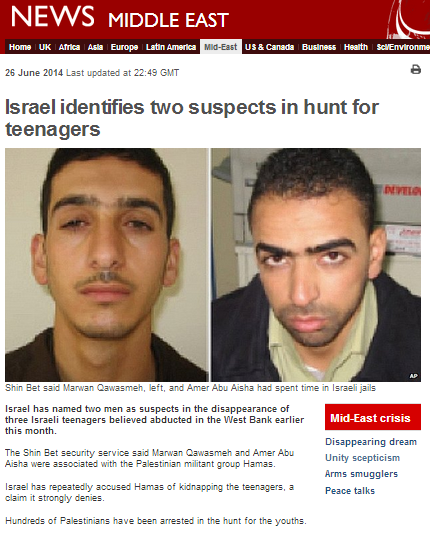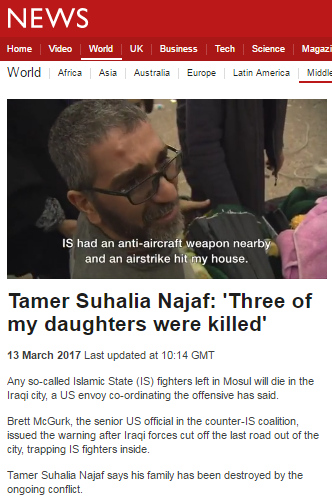The lead story in the February 18th afternoon edition of the BBC World Service radio programme ‘Newshour‘ was described as follows in the synopsis:
“Israel’s prime minister launches a stinging attack on Iran, telling a security conference in Munich the country is the “greatest threat to our world”. Benjamin Netanyahu said Israel would “not allow Iran’s regime to put a noose of terror around our neck”.”
Presenter James Coomarasamy opened the item (from 00:45 here) by insinuating that an Iranian drone may or may not have breached Israeli airspace the previous week. [emphasis in bold added, emphasis in italics in the original]
Coomarasamy: “We begin now at the Munich Security conference – a forum for discussing security threats but today it put a case of insecurity very firmly on display. The conference became the backdrop to a rhetorical clash between Israel and Iran a week after the two countries’ militaries came into conflict over Syria. Well Israel lost a fighter jet in that clash which followed what it said was the interception of an Iranian drone which had crossed from Syria into Israeli territory. It was the first time an Israeli war plane had been downed in more than a decade.”
After listeners had heard excerpts from the Israeli prime minister’s speech and the Iranian foreign minister’s speech at that conference, Coomarasamy introduced his two guests – Giora Shamis of the controversial Debkafile website and Iranian-American SOAS professor Laleh Khalili.
So what did BBC audiences worldwide learn about the activities of Iran and its proxies in Syria and the wider Middle East or why Israel views the Iranian presence and influence on its borders as a threat? The answer to that question is not much. Listeners did however hear quite a bit of dubious, politically partisan analysis from Khalili – none of which was challenged by the BBC presenter.
Khalili: “There are obviously three elements about what is going on at the moment that makes it all a bit scary, the first of which is that the Trump administration is in place which is probably more likely to give a green light to conflict by Israel, although the Trump administration itself is quite divided on this issue with some of the higher echelons of the military not wanting to cause further conflict in the region. The second element is of course the major rapprochement between Israel and the Gulf Arab states and especially Saudi Arabia. The third thing which I think makes things particularly dangerous is the fact that Netanyahu has over the course of his entire rule in Israel been accused of corruption a number of times but now the police have referred him to the attorney general in Israel and of course the wag the dog situation [laughs] is extremely relevant here and could potentially result in further conflict, which is what Netanyahu would want: the more conflict there is in the region, the better it benefits the Israeli security establishment if not the Israeli people.”
Coomarasamy made no effort to question that ‘theory’ or to remind listeners that it was Iran that sparked the recent clash by infiltrating Israeli airspace. After Giora Shamis had mentioned the establishment of Iranian military bases in Syria and additional factors, Coomarasamy asked Khalili about “events on the ground” – meaning the drone infiltration – but allowed her to avoid the question and instead promote more unchallenged propaganda aimed at downplaying Iran’s activities.
Khalili: “The fact is that there are confrontations, whether by proxy or directly, happening between Israel and Iran for decades now and what Netanyahu does – and in fact actually most of the conservative Israeli security establishment do – is constant fear-mongering. The problem is really not with whether or not there are other threats or real threats or real clashes. The problem is with Israel’s militarist, expansionist policies that have essentially become more and more entrenched and more and more fired up whenever Netanyahu feels his own power domestically threatened.”
After Khalili had referred to Netanyahu as “preening quite a bit and posturing quite a bit”, Coomarasamy asked Shamis for his “response to the idea that what is happening now is in part the prime minister of Israel trying to divert attention from his own domestic challenges”, to which Shamis replied that in his opinion, the current Israeli government will be in power for at least another year.
Coomarasamy next asked Khalili about Javid Zarif’s “dismissive” response to Netanyahu and “how worried are the Iranians?”.
Khalili: “They have to consider this but also I’m sure the dismissiveness comes from the direction of remembering how much Netanyahu is into these kinds of theatrics. I mean we haven’t forgotten his UN presentation which was of course the subject of much mirth and mockery later. […] But it is also really important to know that it’s not just the Iranians that are being dismissive. I just have been looking on Twitter and all the people who are at the actual security conference, a lot of the Europeans who are Tweeting are also being in equal measures concerned about Netanyahu’s posturing and also dismissive of, again, its theatrical elements.”
She went on:
Khalili: “…this conflict has been on a low simmer for decades. It’s not new. I mean the fact that the Israeli security establishment have been assassinating Iranian scientists inside Iran and Iranian military people outside of Iran, it’s not like there’s been all love and roses [laughs] for the past few decades and yet this conflict has been going on. But the fact is that the conflict has been ongoing so its being ratcheted up is perhaps what’s interesting, dangerous and worrying.”
Without questioning or qualifying Khalili’s allegations or even reminding listeners of, for example, the relevant topic of Iranian military activities along Israel’s border with Syria, Coomarasamy closed the item there.
The BBC’s public purposes oblige it to “provide accurate and impartial news, current affairs and factual programming of the highest editorial standards so that all audiences can engage fully with issues across the UK and the world”. The unchallenged efforts of activist academic Laleh Khalili to frame the story as being about “theatrics”, “fear-mongering” and Israeli domestic politics – while completely erasing Iran’s activities from the picture – are of course not in the least surprising. However, such blatant propaganda obviously contributed nothing to BBC audience understanding of the serious topic of Iranian expansion and belligerency in Syria and the Middle East in general or of Israel’s position on that issue.
However, Newshour’s partisan framing of that story was not over yet – as we will see in part two of this post.




